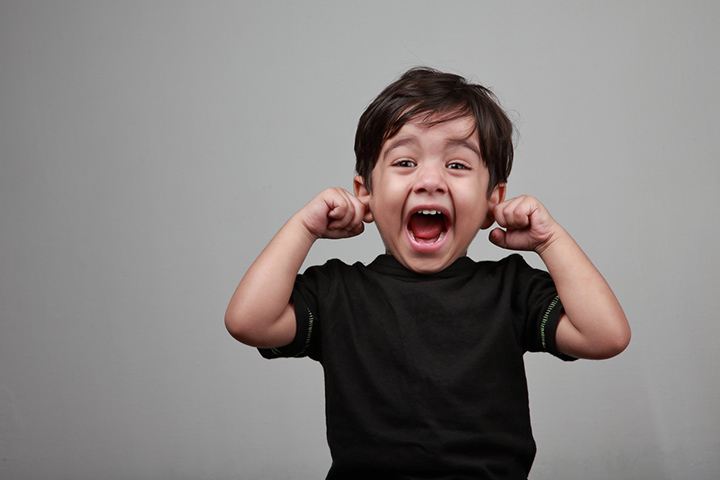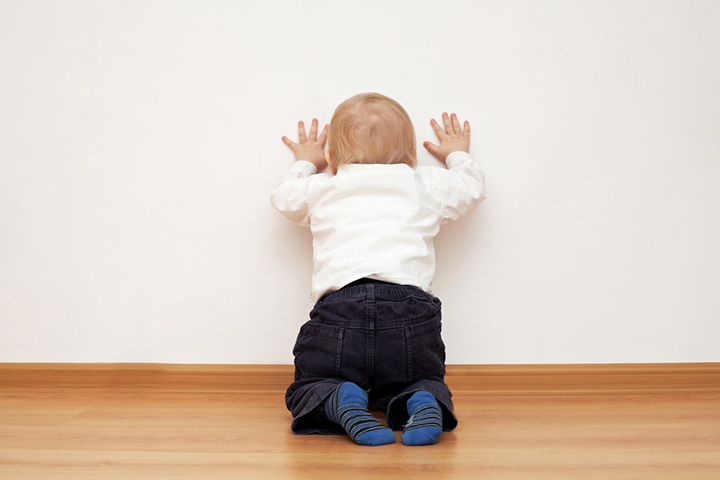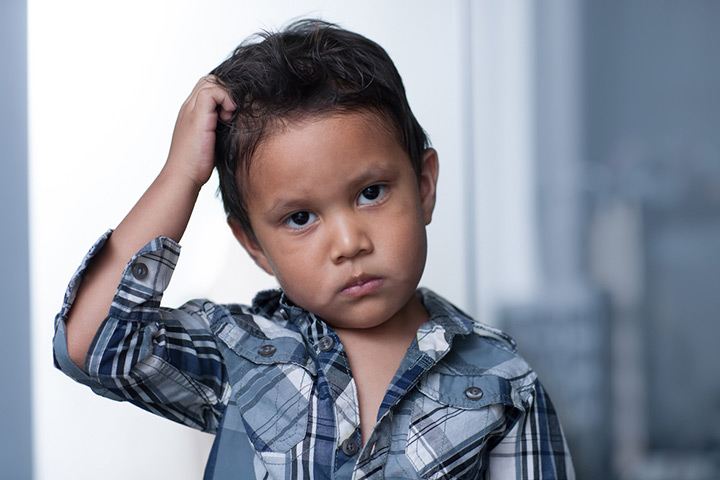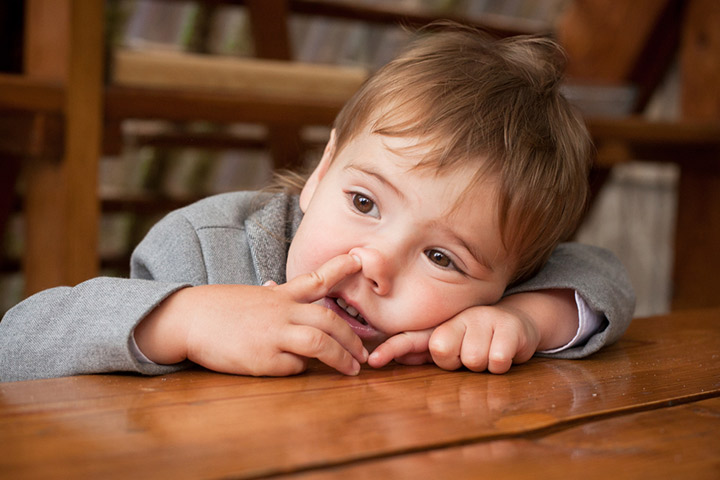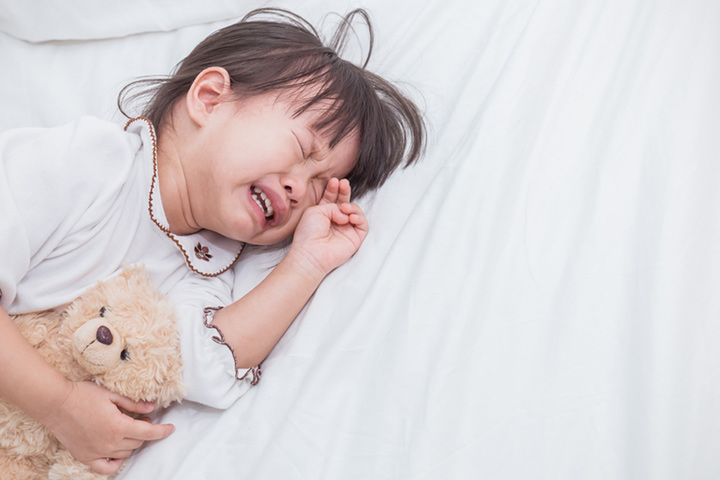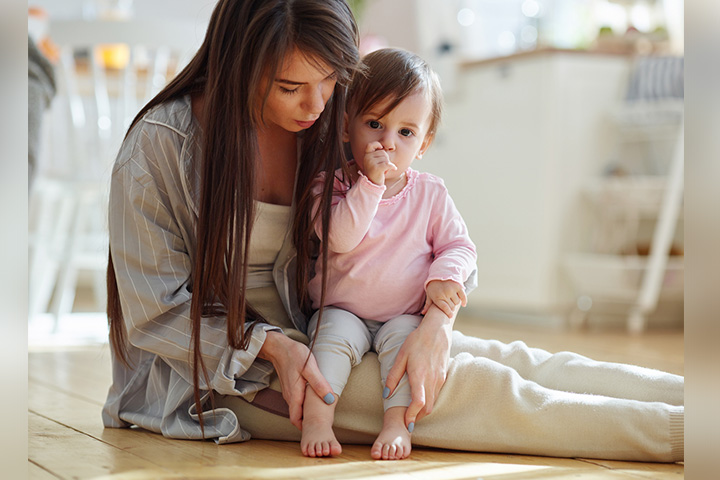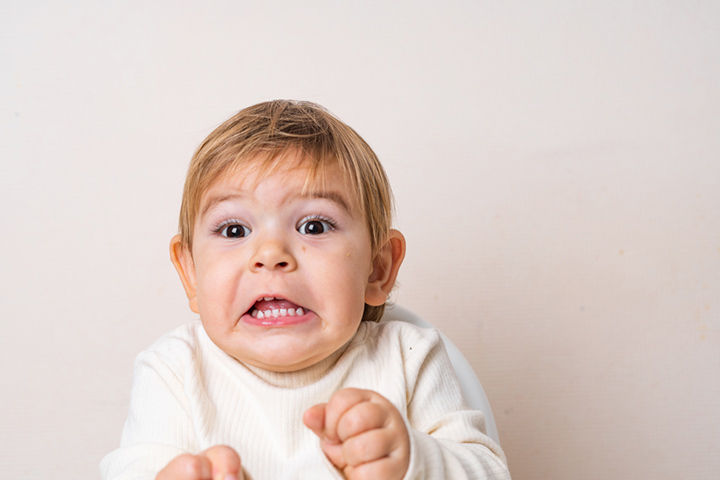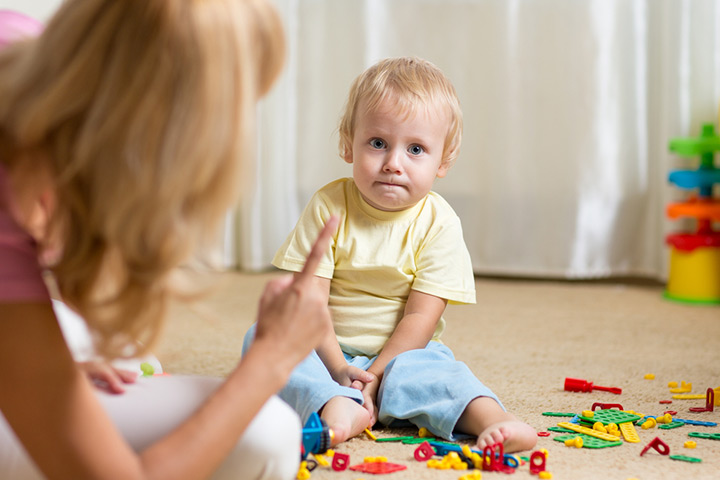
Image: Shutterstock
Temper tantrums and unruly behavior are common ways in which children express their frustrations. These bad habits are outlets for the younglings who are still years away from being able to properly express themselves by speech. You will be glad to know that these habits are not permanent and will wear away gradually as they slowly grow up.
There is no denying the fact that these young adorable devils can get on our nerves from time to time. In fact, research has shown strong correlations between parental stress and child behavior problems (1) . However, parents don’t have to be mute spectators to such unruly habits. There are definitely ways to control and guide your child through such hotheadedness. Keep reading to know more about such bad habits and what you can do about them:
Commonly Seen Bad Habits In Toddlers Which Are Socially Unacceptable
Behavior issues are common in all toddlers. If your toddler has trouble expressing their needs or dealing with pain and sadness, they will show frustration through bad habits. Here are the most common bad habits in toddlers that parents should be aware of:
1. Banging Their Head
Image: Shutterstock
Headbanging is a common motor activity in young children. The common reasons for toddlers to bang their heads are – self-soothing, venting of strong emotions, throwing a temper tantrum, seeking attention, or dealing with developmental disorders like autism (2). Sometimes it is also observed for relieving the pain of an ear infection or dental pain. However, children are aware of their pain threshold. They’ll withdraw when they cannot endure the suffering any longer..
2. Hair Pulling
Image: Shutterstock
If your toddler twirls and pulls their hair aggressively, causing bald patches, it is indeed a cause for concern. Medically, this condition is referred to as “trichotillomania”. This hair-pulling condition can cause kids to pull out their hair from the scalp, eyebrows, or eyelashes (3).
3. Nose Picking
Image: Shutterstock
Nose picking in public reflects poor personal hygiene. It is a bad habit if your child constantly picks their nose and worse if he/she licks or eats the content. When your child is sick or has a runny nose, they will do it more often to clear the nasal passage, alleviate irritation and breathe comfortably. Before long this can become a regular habit in your kid and getting them to stop could prove a challenge.
4. Kicking And Crying Fits
Toddlers often kick and scream when they throw a temper tantrum. They may be trying to express their unhappiness or frustration while doing so. While it is totally normal for kids to be brats once in a while, regular tantrums like these need to be checked by parents.
5. Thumb Sucking
Toddlers often indulge in non-nutritive sucking of the thumb or pacifiers to self-soothe. Thumb-sucking has a comforting and calming effect on toddlers. This is more common when they are unable to regulate their emotions. What makes this a not-so-good habit though is that it could alter jaw shape, develop “buck teeth”, and affect speech later, making it difficult to pronounce “s” and “th” correctly (4).
6. Teeth Grinding
Teeth grinding or Bruxism is a common issue in toddlers and is characterized by clenching the teeth. Children grind their teeth mostly at night to relieve stress or anxiety. Although teeth grinding will go away by the time your child is six years old, sometimes it does continue into adolescence. Unless they break the habit, it could pose dental problems when they grow up (5).
What Can You Do To Break Your Toddler’s Bad Habits?
Understand that children imitate those around them. What they see is what they learn. If your child spends more time with people with bad habits, they will likely pick them up. Yelling, scolding, spanking, or punishment may be counterproductive. Be patient, empathetic, and consistent while dealing with your toddler to help them break free from their bad habits.
A single approach may not lead to successful results. You could combine a few of the following tips to notice some changes in your child’s behavior. Here are some things you can do to intervene and rectify these bad habits in your toddler:
- Practice what you preach. Get the whole family to display good habits so that your child can learn what is ideally expected of them.
- Use positive reinforcement to help your child. This means that you reward them when they act right. However, refrain from making it seem like a bribe.
- Look out for their triggers by paying close attention to their behavior. If they seem irritable, stressed, or bored, appease them with hugs or reassure them of your love to comfort them.
- Offer them gentle reminders to stop when they engage in a bad habit. Avoid putting pressure on them, or it could delay the process of breaking their bad habits. Explain to them what good and bad behavior are.
- Never ridicule your child in public, or they may feel ashamed, neglected, and abused. This could significantly affect their mental health at a later stage (6).
- Stay calm when your child engages in an embarrassing act publicly. Be persistent in dealing with bad habits to see positive results.
- Try paying no attention to negative behavior, especially those that call for immediate attention, such as temper tantrums. Turn your gaze away and try ignoring them mid-tantrum. When they are quiet, praise them for managing their frustration. This will allow them to learn their boundaries.
- If your child is addicted to thumb sucking, give them a pacifier instead and then slowly get them into the habit of dumping it. Set a specific time when they can use it, probably nighttime, and reward them when they can successfully avoid thumb-sucking.
- If your toddler engages in hair pulling, headbanging, or other self-destructive aggressive behavior, speak to your doctor to find out the underlying issues that may be causing them.
- Avoid saying “no” to everything. If your child pays no heed, repeat your request. Turn your lessons into a fun activity. Your child is more likely to learn it quickly without much resistance.
- Teach your child the consequences of misconduct. Take away something they hold on to for dear life, such as a toy, if they repeatedly display a bad habit. Return it when they learn their lesson successfully.
Remember that behavioral changes take time. Despite your sincerest efforts, you may not notice positive results immediately. Harsh methods will only create bitterness and hurt for everyone in the family. So, encourage them to communicate their needs and be there for them. Is your toddler displaying some odd habits that are causing you to worry? Do share with us how you got rid of bad habits in your child in the comments section below.
References
- Parenting Stress and Child Behavior Problems: A Transactional Relationship Across Time
https://www.ncbi.nlm.nih.gov/pmc/articles/PMC4861150/ - Head banging in young children
https://pubmed.ncbi.nlm.nih.gov/2021098/ - Trichotillomania
https://www.schn.health.nsw.gov.au/fact-sheets/trichotillomania - Abnormal Oral Habits: A Review
https://academicjournals.org/journal/JDOH/article-full-text-pdf/C0C201F5216 - Teeth Grinding in Children
https://healthychildren.org/English/healthy-living/oral-health/Pages/Teeth-Grinding-in-Children.aspx - Child Abuse And Neglect: A Major Public Health Issue And The Role Of Child And Adolescent Mental Health Services
https://www.cambridge.org/core/journals/the-psychiatrist/article/child-abuse-and-neglect-a-major-public-health-issue-and-the-role-of-child-and-adolescent-mental-health-services/B5CA48E91A939BC937AABF6C5B99440E

